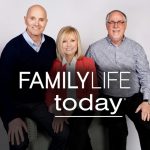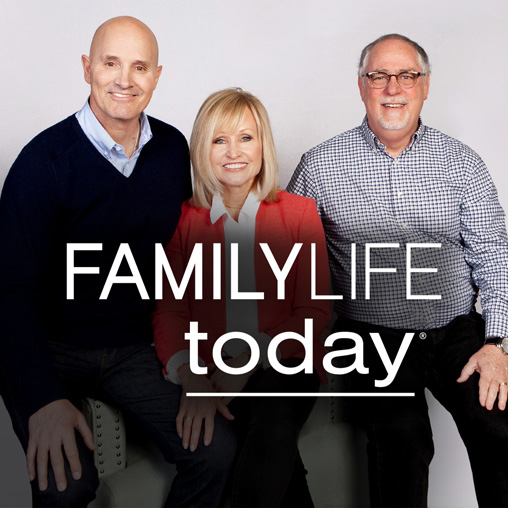
Great Purpose in Great Adversity
, author of the book "Walking Through Fire," joins hosts Dave and Ann Wilson as she tells her story of how God has a purpose for her pain. Hear how she developed polio at 3 months of age and faced overwhelming adversity in her life.
Show Notes
About the Guest
-
- Download FamilyLife's new app! https://www.familylife.com/app/
- Find resources from this podcast at https://shop.familylife.com/Products.aspx?categoryid=130.
- Check out all that's available on the FamilyLife Podcast Network. https://www.familylife.com/familylife-podcast-network/
-
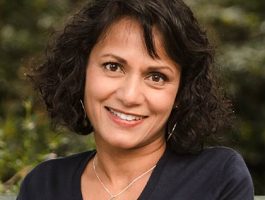
Vaneetha Risner
Vaneetha Rendall Risner is a writer and speaker who is passionate about helping people find hope in their suffering. Her memoir, Walking Through Fire: A Memoir of Loss and Redemption as well as her devotional, The Scars That Have Shaped Me: How God Meets Us in Suffering both encourage readers to turn to Christ in their pain. Some of her greatest joys a...more
Vaneetha Risner tells her story of how God has a purpose for her pain. Hear how she developed polio at 3 months of age and faced overwhelming adversity in her life.
Great Purpose in Great Adversity
Bob: As a child, Vaneetha Risner was diagnosed with polio, a disease that would affect every aspect of her life for the rest of her life. That’s something she began to recognize very early.
Vaneetha: I had just been out of the hospital, and I had been in for a year. One day, walking a little bit home from school by myself—my parents rented an apartment exactly opposite my school—so I was going to surprise my mom. These boys came up from behind a rock. They started throwing stones at me, and they called me a cripple. That was my first memory of: “The world is not safe. I’m not going to be protected.”
Bob: This is FamilyLife Today for Monday, March 1st. Our hosts are Dave and Ann Wilson; I'm Bob Lepine. You can find us online at FamilyLifeToday.com. Growing up with a disability can bring more than just physical challenges. That’s something that Vaneetha Risner learned as a child. We’ll hear from her today about how God met her in the midst of that challenge. Stay with us.
Bob: And welcome to FamilyLife Today. Thanks for joining us. I did an interview many years ago, before I came to FamilyLife®, with and author, who—
Dave: I got to say, “You’ve done a lot of interviews.”
Bob: I’ve done a lot of interviews. [Laughter] This was with an author who had been through significant adversity in his life. I remember asking him the question: “If we could go back to the beginning, and I could say, ‘You can have that adversity removed from your life and live a trouble-free’—or your know, not trouble-free, but—‘a less-troubling life?’” He said, “No; what I’ve learned about God, I would not trade for less trouble.”
I did not believe him and am still not sure; you know?
Ann: Yes.
Bob: I mean, you meet somebody, who’s going through real pain and adversity, and you think, “Who would choose that?”—nobody would choose that.
Ann: Yes, you would opt out of that struggle. It’s a hard question too: “Why does God allow that?”
Bob: Yes.
Dave: I tell you as you ask that question, Bob, I’m thinking, “Okay, the pain I’ve gone through in my life—with divorced parents/my little brother dying—I initially think, I wouldn’t trade it.”
Bob: Really?
Dave: As horrible as it was, it’s who I am. It’s shaped—
Ann: It’s shaped you.
Dave: It’s shaped me into the man that I am today.
Bob: We have a guest joining us this week who has been through adversity. Vaneetha Risner is joining us. Vaneetha, welcome to FamilyLife Today.
Vaneetha: you. It’s great to be here.
Bob: Just that smile and joy in your voice—
Ann: That’s what I was going to say, Bob. [Laughter] What would you expect her to be like?—[monotone voice] “Hi, I’m here”? [Laughter]
Bob: It almost betrays you’ve lived through in your life because, as you’ve shared in your new book, which is called Walking Through Fire, you have had a life has been marked by adversity.
Vaneetha: It has; but I say—also to your point, Bob—I feel like my life has been marked by joy because everything that God has taken away, He’s given me so much back in Himself.
Bob: So you understand why those of us, who have not gone through what you’ve gone through, hear you say that and go, “You’re just putting a spin on this to try to live with the adversity you have dealt with.” Do you understand how we would feel that way?
Vaneetha: Yes, I do. I think, before I had gone through all of this, I would look at people’s lives that were really hard and think, “I couldn’t go through this/that; and if I had to, I would be angry at God, and I would hate life.” I feel like the harder life has gotten, the more joy God has given me, which sounds—
Ann: —miraculous.
Vaneetha: —crazy.
Bob: Yes.
Ann: Yes!
Vaneetha: But I am actually than most people I know.
Dave: got to be honest—and we’re going to get into your story because the listener, yet, doesn’t know the suffering you went through—but even when I hear you now, I’m like, “It can’t be true.
Bob: Yes.
Dave: “It can’t be that real in terms of your joy.” When I read it—and we’re going to get there—I was like, “Okay, I can’t wait to meet her; because I don’t know if it’s possible what she’s saying.” I’m looking at you with this smile, going, “It’s real!”
Ann: I think we were all curious because we’ve all read your book; and we were all like, “Wow! She exudes the love of Jesus and joy in her life.”
Bob: Your adversity wasn’t something that came after you’d had 30 years of trouble-free existence. You developed polio in your childhood; right?
Vaneetha: Yes, I did.
Bob: I didn’t even know there were still people who were contracting polio. We all think that polio is one of those things that’s gone; that we’ve eradicated it. But share how that diagnosis came about and what you remember from all of that.
Vaneetha: I was actually three months old, so I don’t remember when it happened. I was in India. In India, they give the polio vaccine at six months. I was three months old; I had 105 degree fever, so my mom took me to the doctor. They thought I had typhoid; so they gave me cortisone, which lowers your fever, but it also lowers your immune system.
Within 24 hours, they think, I was probably paralyzed then. Then went back to the doctor. The doctor said, “Oh, I think she has polio.” They said basically, at that point, there’s nothing they could do for me. I was a quadriplegic; I could not move my arms or my legs.
The told my parents they needed to leave India; because in India, several things: one, their medicine wasn’t as advanced as the Western world. But secondly, in India, with a disability, you have a huge disadvantage. People think you’ve done something wrong; your family is cursed, so there are no services for people disability; there’s no accessibility. They basically said to my parents: “If you want anything for her, you’re going to have to leave.”
My parents did. My dad was a professor, in India, in electrical engineering. They left immediately and went to London. My dad took a job installing telephones.
Dave: Your family went from sort of a plush, aristocratic lifestyle to what?
Vaneetha: —to close to poverty. I mean, my mom said, at the time, you couldn’t take any money out of India; so they went with almost nothing. She said they couldn’t afford hot water, so they just used the cold water and slept on a mattress on the floor.
Bob: Wow!
Ann: Vaneetha, what did your life, as a little girl, turn out to be? What happened?
Vaneetha: I had my first surgery in England when I was two. Then my dad got a job in Canada, so we moved to Canada. I went to a free hospital called the Shriners Hospital. At the time, it was the Shriners Hospital for Crippled Children; and kids would live there, basically. I lived in the Shriners Hospital for years—not—one time, I lived there for a year continuously. I was in a body cast, so I was flat on my back in a ward with about 14 other girls.
I spent/I would say, every year, I would spend, at least, three months in the hospital. Life for me was this mix of: being at home/being with my family, going to “normal school,” and being in the hospital.
Dave: Do you remember how your parents dealt with this?—because, as we hear your story, this fact goes back to human error.
Vaneetha: Yes.
Dave: It’s one thing when it’s out of your control. But when you can put a name on a person that is somewhat responsible, that’s extremely hard to deal with. Do you remember how your parents, or even you, dealt with it?
Vaneetha: I think my parents dealt with it by their faith in God. I didn’t have faith in God at that point; I was actually very angry at God. But I think my mom and dad both saw: “God has done this, and God is going to use it”; and they didn’t know how.
Bob: Tell us how they came to faith; because India is not known for people, who have faith in God.
Vaneetha: That is an amazing story on both [of my family]. Both sides, I would say, in the 1800s, had people that were converted. On my dad’s side, my great, great, great grandfather was part of a Hindu Brahman family. His father was a priest, but they had him educated in a Christian school so they could learn English; and he came to Christ then. It’s pretty incredible; like his dad was so angry about it. When he came home from school one day, he had all the family jewels on one side of this huge scale/all their money, and the Bible on the other. He said, “You need to choose.” He picked up the Bible and never saw his family
Bob: Wow!
Ann: Wow!
Vaneetha: —that’s one side.
Then the other side was a similar story. Actually, my great, great grandfather was a merchant and was in a bazaar, looking at things; and somebody gave him the Gospel of John in a tract. He read it and said, “This is truth,” and came to Christ, and had to leave his family; because there was so much persecution for becoming a Christian.
Bob: So they [Vaneetha’s parents] were believers from childhood.
Vaneetha: Yes.
Bob: They had grown up in the faith. That foundation gave them something to hang onto when their daughter was misdiagnosed and mis-treated in the hospital.
Vaneetha: Yes.
Bob: For you though—I was thinking about it—you said you were angry with God. This was really all you’d ever known. This was your normal.
Vaneetha: Right.
Bob: When did you start to process: “Wait, this is my normal; but I’m getting the raw end of the deal here. Not everybody has to suffer like I do”?
Vaneetha: Two different one way in the hospital/in the ward, there was a TV. I remember watching TV, thinking, “This is not my life.” I would watch TV and see kids
doing things and thinking, “I’ll never do that.” It almost felt sort of surreal, like I was a kid in a candy store, sort of pressing my face against a window to see things that I would never have; that was one picture.
As well, as when I was home, I was really bullied. When I was seven—I learned to walk at seven—and I remember one day walking a little bit home from school by myself—my parents rented an apartment exactly opposite my school—so I was going to surprise my mom. These kids/boys came up from behind a rock. They started throwing stones at me, and they called me a cripple.
I didn’t know how to process that. I didn’t even know what that exactly meant. I had just been out of the hospital, and I had been in for a year. That was my first memory of: “The world is not safe; I’m not going to be protected.” That is when I remember just feeling angry when my parents would talk to me about God.
I feel like before that—that just sort of made sense to me—“Okay, there’s a God.” But when I saw that I was really discriminated against/made fun of, and everybody else’s life seemed to be really good, that’s when I started getting angry.
Bob: Were you on crutches throughout your childhood/in a wheelchair?—what was it?
Vaneetha: that, I had braces. I never had crutches, because my arms are much weaker than my legs. I would walk with braces and sort of hold onto the walls or people would help me. My parents would carry me around a lot when I was little. They had this thing that they didn’t want me to be in a wheelchair, because their goal was always for me to walk; so I did not use a wheelchair. Then after I was seven, I didn’t need braces or anything; I could walk. But the time between then was a lot of being carried around; scooting around, really on my bottom, when I went through our house; and not going that many places; and lots of surgeries.
Ann: How many surgeries did you have?
Vaneetha: I’ve had 21 operations before I was 13; and since, I’ve had a few as well.
Ann: Wow! I can see how you would have this anger and angst toward God.
Vaneetha: I just thought, “God doesn’t care about me.” When people would say that—that “God really cares about you,”—I thought, “You have no idea what I’ve been through. If you did, you wouldn’t say that.”
Ann: Did you have hope for your future?
Vaneetha: No; I really didn’t have any vision of what the future could look like for me. I wouldn’t say I ever thought about going to college or living a normal life, because I thought I felt like I was probably going to be at home with my parents.
Dave: I can’t your daughter, who spent a year in a cast, gets out and is walking home from school, and gets bullied—as a parent—
Bob: Yes.
Dave: —I don’t care how great my faith is—[Laughter]
Ann: What would you do?
Dave: —there’s part of me thinking, “Those kids are going to/they’re going to hear from me. I am so angry. They do not little precious daughter is starting a whole new life, and she gets picked on, on the way home.” I mean, how did they respond?
Vaneetha: I did not tell them.
Dave: Oh.
Vaneetha: I didn’t want them to know, because I was embarrassed; I thought I had done something wrong. I’ve read that’s what happens when people are bullied; they feel like it’s their fault. I would try to walk straighter, because of my limp. I tried to do everything to blend in more and assumed it was something that I had done; so didn’t tell my parents about any of the All through grade school, I was bullied; and I didn’t tell anyone.
Ann: Well, you got a little older.
Vaneetha: Yes.
Ann: Did life start looking a little more normal in terms of comparing it to other kids?
Vaneetha: It did. When I got to high school, I started to kind of reframe. I made some friends; and I thought, “Okay, this might be okay. I might be able to have a normal life.” Got involved in FCA/Fellowship of Christian Athletes, not because I was an athlete or a Christian; but all the cute guys in my high school went to FCA, so I was all about that. [Laughter]
Ann: I like that. You said you sat in the back row with your friend.
Vaneetha: Yes!
Ann: What did you talk about?
Vaneetha: We talked about all the cute guys; that’s all we talked [Laughter] I don’t really remember they said anything else in FCA, besides looking around. Then one day, though, she came back—she went on a retreat—and she said to me, “God is real.” I remember she just kept talking to me about it.
One night, I went home; and I just said, “God, if You are real, show me.” I really didn’t expect an answer; I didn’t think that God was listening. I went to bed and didn’t really think much about it. But the next day, I remember getting up and thinking, “You know what? If God is real, then maybe I should see what the Bible says. I opened the Bible; and I just was asking God, “Why/why did this happen? If you really love me, and if You’re real, then show me why this happened,”—and flipped open the Bible to Leviticus—
Ann: Oh, no! [Laughter]
Vaneetha: —and just thought, “Okay, wow! This is exactly what I thought the Bible was about.” [Laughter] Then I moved on to some other passages. Then I just asked one more time, “God show me.” I flipped open to John 9, and the passage where the disciples are talking to Jesus. They see a man blind from birth; and they ask, “Who sinned, this man or his parents, that he was born blind?”
Jesus says, “It is not that this man sinned or his parents, but that the work of God could be displayed in his life.” That was the defining moment for me. It felt that God was answering my question—not “What had I done?”—but “Why?” of “Is there a purpose?” Those are very different questions. It wasn’t the question I had asked, but it was the answer I needed. “There is a purpose”; it felt like God was talking to me.
That’s what I love about the Bible—is God can actually talk to us—I don’t think I had ever seen that or even heard that concept before. I remember just saying, “Okay; God, You know me. You heard my question. You gave me the answer for the purpose of my life: That I could glorify You.” I committed my life to Christ then and really had a very different outlook than I had before, where I had no hope; because it felt like: “What had I done?” “Why did this happen?” “What was the meaning?”
God to say, “There is meaning and there’s purpose, even though you may not know it,”—knowing there is purpose changes everything.
Bob: I remember being a young dad. I think our daughter was about three years old; Mary Ann was pregnant with number two. We were out, walking around the neighborhood, with Amy in the stroller.
Mary Ann and I had this conversation—this almost sounds terrible to say—but we kind of agreed with one another that, if we had the choice between one of the two of us going through suffering or our child going through suffering—I mean, I would feel terrible if Mary Ann had to go through an experience of suffering—but it’s almost like, “You’re a big girl; you can handle this.” But a three-year-old—if your three-year-old is going through this/your two-year-old—if you’re my seven-year-old, in, a year, in a body cast—I’d be crying out to God and saying, “Lord how can this be Your good purpose for her/for us?” Did your parents—was their faith, at all, shaken by what their daughter was having to go through?
Vaneetha: I think my mom—and this is, actually, a really kind of amazing story—when I got polio, my mom cried out to God, like, “What did I do? Show me if I’ve been sinning and this is sort of what You’ve brought into my life.” God assured her, “No, it wasn’t,”—but He used the exact same passage from John 9—that is the verse that my mom really clung to, like: “God is going to use her life”; but I didn’t know that. The other thing is—my mom said she prayed, and prayed, and prayed when I got polio—and she had this strange sense that God said, “I’m going to make her whole at 16”; I came to Christ at 16.
Ann: And you were healed in a way.
Vaneetha: Yes, I gave my testimony—my mom was teaching a Sunday school class, and I gave my testimony—she asked me to. I had never given it to her; she started sobbing in the back. I went over to her afterwards, and I said, “Why are you crying so much?” She said two things: “One, that was the verse that God gave me,” and “Two, I had always thought you would be whole at 16; and that is exactly what you are.”
Bob: If God had given you a son or a daughter with polio/with an infirmity—or if you were talking to parents today, who have got a child like this—what would you tell them? What’s the best thing they can do as they raise a child, who’s wrestling with: “Is God good?” “What about my body? What about my limitations?” What’s your counsel to them?
Vaneetha: I think I would tell them to trust God, because it’s a long game; and that they don’t need to see their child commit their life to Jesus, or to trust that this is good, right then. Because I feel, when people try to push that on someone, when they’re not ready, it turns them away from faith. But saying, “I don’t know why this happened; but I know God is going to use it, and God loves you. But this is hard. I want to sit with you, and I want to cry with you, and I want to be there for you through every second of it.”
I think parents, who try to over-spiritualize it, for me/to kids, could turn them against God more than help them. I think just saying: “I do know God is in this,” and “God is with you,” is very helpful.
Ann: I do know—and I would agree with all of you—that to watch our kids go through pain is one of the greatest sufferings that a parent goes through.
Bob: Yes.
Ann: We just mourn and we ache for them, sometimes more than they ache for themselves. I’ve shared this before, but our oldest son has ADD. As he was going through school, I mean, it was a struggle. I just would watch him, and this is nothing compared to polio or being—having all these surgeries—this is nothing; and yet, I watched him struggle; I watched him change a little bit.
I was mad at God. I asked those same questions: “I don’t get it, God. What would be the purpose to this?” Sometimes I say that flippantly. But then I started praying it fervently, saying, “God show me the purpose. I need Your wisdom; I need Your answer.”
I’d get pretty strong; I’m like, “I’m going to fast until I hear from you.” Well, I didn’t know it would go for days. [Laughter] It’s day seven, and I said, “I’m not going to eat until I hear from you,” thinking I would hear from Him right away. On day seven, I was praying again, like, “Lord, I just don’t see the sense. I need to hear from you. I need Your wisdom through people, or through Your Word, or something to give me hope for him.”
I was reading in Exodus. It’s when God had given the instructions to Moses. Moses was battling with God, saying, “I can’t speak; I can’t free these people, [paraphrased]” and God’s response to Moses was—and this is the first—I’d read this tons of times—but God said to Moses, “Did I not make the blind? Did I not make the mute?” [Paraphrased] It stopped me; I was thinking like, “What? Wait! What does that mean?” I felt like, in my spirit, God was saying, “Do you think I’m surprised by what has happened and what your son is going through? Do you not think My hand is in it?”
It was the first time I felt like, “Okay; if You are in this, then I can walk through it; and I will trust You with him, and I will trust Your future for him.” I had a freedom and a sense of: “Okay, Lord.” Sometimes, I think we give up too early in hearing from God. We need to be on our knees and fasting; we need to be in the Word; we need to be with people that are counselling us with wise counselling, because God wants to speak to us.
Bob: if this was all you’d ever had to walk through, that’s—
Vaneetha: —hard enough.
Bob: —that’s a lot. But this was really a foundation for what was ahead for you. In fact, you share about, in your book, the various trials you’ve found yourself walking through in your life. It’s really a remarkable story. It’s called Walking Through A Memoir of Loss and Redemption .
We’re Vaneetha’s book available this week to any of our listeners, who would like to hear the rest of the story, and who can help support the ministry of FamilyLife with a donation. Your donations are the lifeblood of this ministry. Your financial support makes everything we do, here, at FamilyLife possible.
When you donate, you are responsible for hundreds of thousands of people every day receiving practical biblical help and hope, encouragement, support for their marriage/for their family. You make all of that possible through your donations. If you can help with a donation today, we’d love to send you a copy of Vaneetha’s book, Walking Through Fire: A Memoir of Loss and Redemption.
You can request the book when you make a donation, online, at FamilyLifeToday.com; or you can call 1-800-FL-TODAY to make your donation by phone. Be sure to ask for your copy of Vaneetha’s book, Walking Through Fire, when you get in touch with us. Again, donate, online, at FamilyLifeToday.com; or call to donate: 1-800-358-6329; that’s 1-800-“F” as in family, “L” as in life, and then the word, “TODAY.” On behalf of the hundreds of thousands of folks you’ll be touching when you make your donation, thank you for your support of the ministry of FamilyLife Today. We it.
Now, tomorrow, we’re going to hear about another one of the challenging chapters in your life, Vaneetha, when your son, Paul, who was seven weeks old, had to be rushed to the hospital. We’ll get details about that tomorrow. Vaneetha will be with us again. I hope you can be here as well.
I want to thank our engineer today, Keith Lynch, with some help today from Bruce Goff, and our entire broadcast production team. On behalf of our hosts, Dave and Ann Wilson, I’m Bob Lepine. We will see you back tomorrow for another edition of FamilyLife Today.
FamilyLife Today is a production of FamilyLife of Little Rock, Arkansas; a Cru® Ministry. Help for today. Hope for tomorrow.
We are so happy to provide these transcripts to you. However, there is a cost to produce them for our website. If you’ve benefited from the broadcast transcripts, would you consider donating today to help defray the costs?
Copyright © 2021 FamilyLife. All rights reserved.
Episodes in this Series
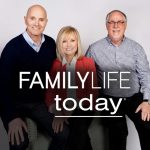
Love After Loss
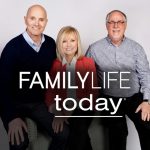
Hope When Things Seem Hopeless
